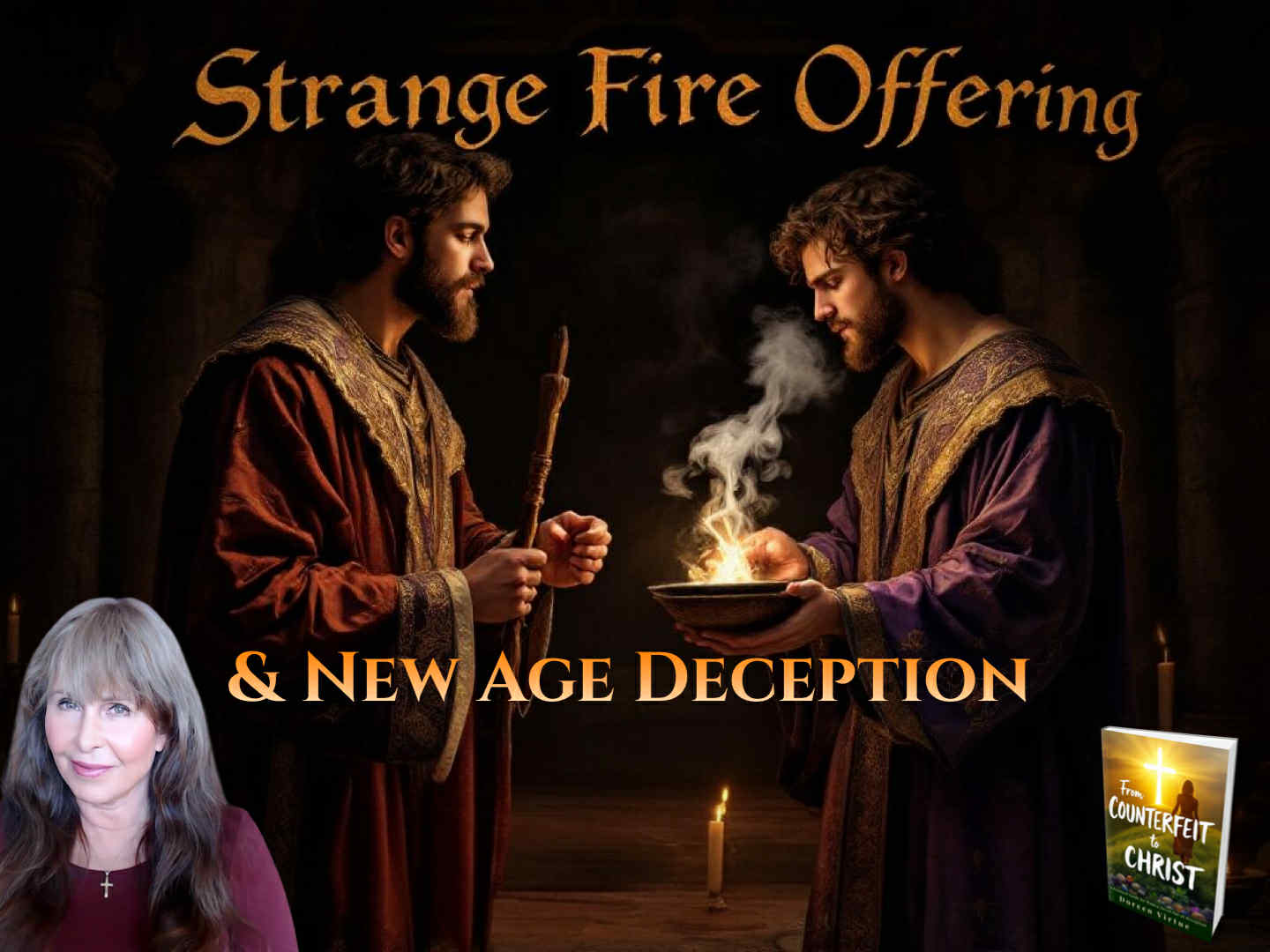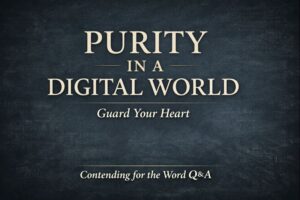⏱️ Estimated Reading Time: 7 min read
Strange Fire Offerings and New Age Deception
By Doreen Virtue, Author of “How to Avoid New Age & New Thought Deception” at https://a.co/d/0DDm3SQ
The Bible’s warnings about false worship are serious commands. One of the most striking examples is the account of Nadab and Abihu in Leviticus 10, two sons of Aaron who offered “unauthorized fire” before the Lord. Their disobedience was met with immediate judgment: “And fire came out from before the Lord and consumed them, and they died before the Lord” (Leviticus 10:2).
This passage is a sobering reminder that God determines how He is to be worshiped. Unauthorized worship is rejected by God because of its roots in pride and presumption. The story of strange fire speaks to today’s fascination with spiritual counterfeits. From New Age rituals to hyper-charismatic practices, humanity continues to offer “strange fire” that imitates true worship while defying God’s commands.
Let’s back up to Leviticus 9 for a moment, which describes a high point in Israel’s worship when Aaron, as the high priest, offered sacrifices according to God’s instructions, and the glory of the Lord appeared to all the people. Fire came out from before the Lord and consumed the burnt offering on the altar, and the people shouted and fell on their faces (Leviticus 9:23-24). God’s presence affirmed His commands for how He was to be worshiped.
Immediately after this climactic moment, Nadab and Abihu offered incense with “strange fire” (Leviticus 10:1). The term describes fire that wasn’t commanded by God, such as drawn from the wrong source, offered at the wrong time, or presented with the wrong heart posture.
The contrast is stunning between Aaron’s fire offering in Leviticus 9 where fire had just come from the Lord in holy acceptance, and the strange fire offering in Leviticus 10 where they sought to manufacture their own fire and tried to add to God’s glory with their own invention.
Moses explained the seriousness of his nephews’ sin: “Among those who are near me I will be sanctified, and before all the people I will be glorified” (Leviticus 10:3). Their death was a demonstration of God’s holiness and His refusal to accept or tolerate counterfeit worship.
The Bible doesn’t explain exactly what the strange fire offering entailed. We trust in the sufficiency and inerrancy of God’s Word, and if God wanted us to know the details about the strange fire, He would’ve have included the details. What offers us important practical applications for today is that Aaron’s sons disregarded God’s worship commands and substituted their own.
The “strange fire” incident warns against human attempts to invent spirituality apart from God’s Word. It was worship on their terms rather than His. Their actions distorted God’s holiness, presenting a man-made spectacle instead of obedient devotion.
We can also see the implications for modern times by remembering that the ancient Near East practiced pagan rituals, incantations, and symbolic fires to summon deities, ward off evil, or manipulate divine forces. Israel was set apart by God’s precise commands to distinguish their worship from paganism. The fire on the altar was commanded to come from the Lord Himself (Leviticus 9:24) and was to be kept burning perpetually (Leviticus 6:12-13). For Nadab and Abihu to introduce unauthorized fire blurred the line between holy worship and pagan imitation.
Their action was a form of syncretism in that they tried to mix God’s truth with human invention. The result was God’s judgment, showing that He won’t accept pagan rituals or self-styled worship.
Strange Fire and New Age Parallels
The same spirit of unauthorized worship permeates the New Age with practices like praying to “the universe” or to “super moons,” or lighting candles to summon spirits, or meditating with crystals all echo the strange fire of Nadab and Abihu. These rituals involve elements that are condemned by God, such as polytheism, divination, sorcery, necromancy, idolatry, and serving the creation instead of the Creator.
These practices are attempts to manufacture spirituality apart from Christ. During my 26 years in the new age prior to God saving me in 2017, I remember how ceremonies encouraged participants to use their imaginations, creative impulses, and “channeled spirit impressions” to decide how to worship. Some of us in the new age believed that we were worshiping God, yet it was tragically a “god” of our own design and not our Creator.
Even within Christian circles, hyper-charismatic movements sometimes substitute man-made emotionalism for the true work of the Holy Spirit. Practices such as “slain in the spirit,” uncontrollable laughter, or choreographed miracles attempt to generate manifestations of power apart from God’s Word. These, too, are strange fire spiritual counterfeits that may impress crowds but which don’t glorify the Lord.
Just as Nadab and Abihu sought to add to the fire God had provided, many today believe the pure preaching of God’s Word and the simple ordinances of worship are insufficient. They introduce rituals, gimmicks, entertainment, or emotional manipulations to create an appearance of God’s presence. Yet such efforts are strange fire.
Whether in New Age or in unbiblical professing Christian gatherings, the heart of strange fire is presumption. Nadab and Abihu presumed that their idea of worship was acceptable.
Modern spiritual seekers rarely stop to consider whether their ideas for worship are what God has commanded. Sometimes this is from rebellion and other times from biblical illiteracy or a seared conscience.
Sincerity in error doesn’t redeem false worship. Cain may have sincerely brought an offering, but God rejected it (Genesis 4:5). Saul may have sincerely spared the Amalekite spoil for sacrifice, but Samuel rebuked him: “To obey is better than sacrifice, and to listen than the fat of rams” (1 Samuel 15:22).
The New Age is filled with false prophets who express that they sincerely want to help people. They falsely teach that one can tap into their own divine power through techniques, rituals, or “positive energy.” The prosperity gospel presumes that faith and spoken words can guarantee health and wealth. But true worship is God-centered, not man-centered.
Moses’ words in Leviticus 10:3 reveal the lesson in the strange fire incident that is still for today: Worship is about God’s holiness. Strange fire blasphemes His holiness by suggesting that He can be manipulated, entertained, or impressed by man-made rituals.
True Worship Centers Upon God’s Holiness
God’s holiness is still the core for worship today. Jesus told the Samaritan woman, “The hour is coming, and is now here, when the true worshipers will worship the Father in spirit and truth” (John 4:23). Worship must align with the truth of God’s Word, and any addition or invention that departs from this standard is strange fire.
The story of Nadab and Abihu also points us forward to Christ. He is the true High Priest who sacrificed Himself with His own blood, offered once for all (Hebrews 9:12).
Yet even under the new covenant, Hebrews 12:29 reminds us: “Our God is a consuming fire.” The deaths of Ananias and Sapphira in Acts 5 echo Nadab and Abihu, showing that God’s holiness still demands truth, sincerity, and obedience.
In our day, strange fire burns in New Age rituals, prosperity gospel spectacles, and spiritual movements that substitute demonic myths and philosophies for God’s command. True worship comes only through Christ, in obedience to His Word and in the power of His Spirit.
The incident of strange fire is a timeless warning to us all. Nadab and Abihu’s presumption shows that unauthorized worship is offensive to God’s holiness. Their judgment reveals that God won’t accept counterfeits, no matter how sincere.
“So whether you eat or drink, or whatever you do, do it all for the glory of God” (1 Corinthians 10:31)
All glory to God in the highest!
For more from Doreen please visit her page at Servants of Grace or at her YouTube.
Doreen Virtue holds a Master’s degree in Biblical & Theological Studies with highest honors from Western Seminary (56 units / 2021), and an MA in Counseling Psychology from Chapman University. Prior to being saved by God‘s grace and mercy in 2017, Doreen was a psychotherapist specializing in women’s issues, rated in the top 15 most influential living spiritual teachers by Watkins, and the top selling new age author in the world. She was born and raised in new thought churches which she attended for 33 years, before segueing to new age and Wicca in 1991 while touring with a mind-body-spirit conference organization. Before her salvation, Doreen frequently appeared on Oprah, CNN, The View, Coast to Coast and other liberal secular media. After the Holy Spirit convicted her of her sins, while she read Deuteronomy 18:10-12, Doreen repented and gave her life to Jesus as her Lord and Savior. Doreen has been helping professing Christians to identify and avoid new age and new thought deception. Doreen volunteers in discipling women who’ve been saved out of New Age in a private Facebook group. Doreen was a speaker at the Answers in Genesis 2025 women’s conference at the Ark Encounter. She has been featured on American Gospel 3, American Gospel TV, Daily Wire, Moody Radio, Spillover, Christianity Today, Cultish, New York Magazine, Spiritual Counterfeits Project, Servants of Grace, and other Christian media.




